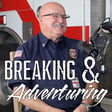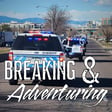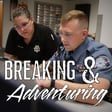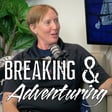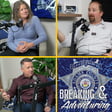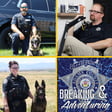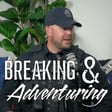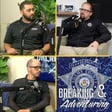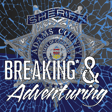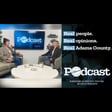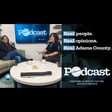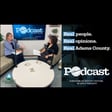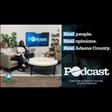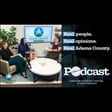Become a Creator today!Start creating today - Share your story with the world!
Start for free
00:00:00
00:00:01

Episode 2 – How To Find A DUI Driver
This week, Sgt. Adam Sherman sits down with Sr. Dep. Brian Phillips of the Adams County Sheriff’s Office Traffic Unit. Dep. Phillips has worked on the roads of Adams County for more than 20 years and specializes in finding drivers who are under the influence. He shares how law enforcement officers can figure out whether a driver is drunk, high, or both while behind the wheel. Dep. Phillips also shares how he measures his success.
Do you have questions? We want to answer them. Send us an email to CommunityConnections@adcogov.org.
Recommended
Transcript
Introduction and Background
00:00:27
Speaker
Hi, welcome back to breaking and adventuring. So I'm Sergeant Adam Sherman, and this is a live look inside the world of the Adams County Sheriff's office. And, you know, we're just going to go through and um look at everything we possibly can. and So for today's show, I've got senior deputy Brian Phillips, who's one of our traffic extraordinary. So we're going to dive deep into the world of traffic enforcement.
00:00:52
Speaker
So first and foremost, tell us a little bit about yourself, career, things you've done. like that Thanks, Adam, for having me here. um I've been a member of the sheriff's office since November of 2003. So I'm working on 21 years.
00:01:07
Speaker
And majority of my time with the sheriff's office has been with the traffic safety team. I started out, did some time in the jail. Then I went to patrol in 2005.
00:01:19
Speaker
two thousand five I did a couple years as a patrol deputy working in the districts and taking radio
Role of a Drug Recognition Expert (DRE)
00:01:27
Speaker
calls for service, and then I moved to the traffic team in the latter part of 2007.
00:01:33
Speaker
ah In the time that I've been in the traffic unit, I've been DUI enforcement specialist, a traffic enforcement specialist, ah First several years of that I was in the traffic unit, at least half of my year rotated back and forth between day shift and a graveyard shift of some semblance where I was a DUI car. right um Doing investigations for motorist driving and influence or or impaired by drugs and or alcohol.
00:02:00
Speaker
um I've... been certified as a motor officer since 2009. I'm a motor instructor. i certified as a drug recognition expert, or or DRE, in 2014.
00:02:16
Speaker
ah Certified as ah as an instructor for DREs in 2019. um I've served as a lead instructor for the state of Colorado certifying new DREs, and I've also served as a course manager as part of the leadership team for the state of Colorado and bringing up and training new DREs as well.
00:02:35
Speaker
ah Recently ran the last DRE school in January and put 15 new DREs out in service. And DRE, so what's that specialized in? So DRE, drug recognition expert, is somebody that when an officer is dealing with somebody, whether it's a result of a traffic stop or a result of a crash, um officers that are on scene in contact with a driver have reason to believe that the driver may be.
00:03:00
Speaker
impaired or under the influence of any impairing substance, ah drugs specifically. Drugs are any substance that when taken into the human body can impair the ability of the person to operate safely.
00:03:11
Speaker
A DRE can be called in in those circumstances if if if the officers arent aren't able or need to build a stronger case to call a DRE to do a systematic standardized drug influence evaluation. It's a 12-step systematic process um looking at ah kind of a preliminary examination where we figure out what the officers saw.
00:03:33
Speaker
what a preliminary or evidential breath alcohol concentration is, and whether the officers on scene, what they observed is consistent with that BAC. If it's not consistent, then the likelihood that we might be looking at drug impairment, and which includes alcohol.
00:03:49
Speaker
um Whether it's consistent, and and if it's not consistent, then we need to look at figuring out what but that impairment is. And the DRE or the evaluating DRE's obligation is is first to determine if if, independently of what was observed on the roadside, if impairment is present, number one.
00:04:07
Speaker
Number two, if it is present, whether it's likely the result of a drug or drugs or a medical condition, and if it's likely the result of a drug or drugs, what category or categories of drugs is causing impairment.
00:04:18
Speaker
um So it gives us the ability to look at whether or not a person is under the influence of central nervous system depressant, central nervous system stimulant, hallucinogens, narcotic analgesics, inhalants, dissociative anesthetics, and or cannabis, or any combination thereof.
00:04:35
Speaker
And to include even prescription pills, even it might be prescribed to me, but if I'm taking too many or because essentially you're not looking for a gotcha, you're looking to make sure somebody can operate a motor vehicle right
DUI Investigation and Training
00:04:47
Speaker
safely.
00:04:47
Speaker
Right. And in if they're safe, right. Cool. We'll well we'll document. and that and and And if they're not safe because of medical medical reason, then obviously we're not going return them to be being behind the wheel of the car.
00:05:02
Speaker
But we' we're going to look at getting that getting that medical care and taking care of priority life if there's a medical condition. Um, and if it is likely the result of a drug or drugs, then we're to do a thorough investigation and figure out what we have to do.
00:05:15
Speaker
Awesome. Well, for anybody that wants to meet Brian, he's usually either here at work or he can go to any place around the state or country and and attend one of his classes because he's a valued instructor and he's all over the place. So, uh, and this just hit me just curious.
00:05:32
Speaker
Do you have something just in your own experience or family history, anything that kind of led you to really have a passion for traffic safety? I know some people have stories of just, you know, like a personal connection to a drunk driving incident or something like that. Is there anything just that led you down this path? In my family or my circle of of peers, no, I've never personally experienced tragedy. tragedy But ah when I started working the road, um you know, the instances of of arriving on scene when there's been a crash or there's been serious bodily injury or a crash and involving serious bodily injury or worse um and seeing the effects of the that it has on those individuals and or their families.
00:06:12
Speaker
um for me fortunately when i in my role in my experience and in my passion fortunately when i started on in the patrol division my first in-car fto was a member of the traffic team and he was a dui guard okay um and prior to that when i was going through phase one which is kind of the classroom portion of training um i ended up being assigned to participate in two different saturations okay Um, so I had five or six DUI investigations before I even hit the car.
00:06:46
Speaker
And then being in my phase first in-car phase, phase two of of my patrol training, my field training officer being a DUI assigned car.
00:06:57
Speaker
And, uh, so and for the record, i mean that's more than what many patrol deputies have like in their patrol career. i mean, yeah, you're pumping out some investigations for sure.
00:07:07
Speaker
So it became something that was really comfortable for me because of familiarity. And that's a lot of times where if if officers aren't doing that kind of impairment, it's because they're not comfortable. with with Same with any aspect.
00:07:20
Speaker
um The more you do it, more the more comfortable you'll become at it, the more effective that you'll become at it, and the less fearful and more you'll be. um So by the time i was I was on my own in a car, i was completely comfortable impaired driving investigations.
00:07:39
Speaker
ah You got me by a long shot. I'd hate to see my stats. um So what's some of that ah specialized training that you just readily put yourself through? So I know you're lead instructor, but like, what are some things that you readily stay on top of?
00:07:53
Speaker
So when it comes to trends and things, right? So when it comes to a parent driving, there's kind of three tiers of, of training. There's, there's the, the first foundational level of training is SFSTs, which is standardized field sobriety test testing, a practitioner in that.
00:08:10
Speaker
They learn how to how to do to do the eye checks for horizontal gaze nystagmus, which is an involuntary jerking of the eye, which is a physiological response um when a person is potentially under the influence of depressants, inhalants, or dissociative anesthetics.
00:08:23
Speaker
um And then they also learn how to administer the walk and turn and the one-leg stand. and So that's the base. And then those are your standard roadside maneuvers. Right. Yep. Right. And then when you move up from there, officers can go to what's called ride, which stands for advanced roadsides impaired driving enforcement.
00:08:41
Speaker
It gives additional tools for the officer who's kind of an intermittent intermediate level of training to be able to also administer a modified Romberg balance test, which allows you connect to kind of gauge what's going on internally with a person's metabolism. Right.
00:08:55
Speaker
Uh, maybe they're a little sped up. Maybe their body's a little slowed down. and it's It's also a divided attention test and figure help you figure out mind and body matching up and doing what your mind is telling you to do. Um, and and ah they also learn how to administer a finger to nose test, which is another divided attention test.
00:09:13
Speaker
And the, uh, they can also, administer or check, do another eye check, checking for what's called a lack of convergence.
00:09:25
Speaker
um If you're checking the eyes and most people's eyes should be able to follow a statement that's coming to about so approximately two inches close to the bridge of the nose and converge on that point, basically cross your eyes in in you know plain speech.
00:09:41
Speaker
It should come be able to come in, cross the eyes, and stay stay stay there for at
Scientific Basis and Impact of DRE
00:09:45
Speaker
least a second. okay um It also teaches the officers how to look look at just generally pupil size.
00:09:53
Speaker
you know if If pupils are dilated or if pupils are constricted, those can be indicative of potential impairment by different drugs. yeah um And then from there, the next the next level, the not the intermediate level, but moving up into the expert level is the drug recognition expert or the DRE.
00:10:09
Speaker
ah which gives them the ability to to administer that 12-step systematic standardized evaluation that looks that gives us the ability to not only look at the impairment side of it, but to also to have kind of a bigger picture of what's going on with the person as as far as ah their physical impairments, are there ah sickness or injuries that could factor in, um are they under the care of a doctor, dentist, medications that they take, time type of things like that.
00:10:35
Speaker
And then we're also going to move beyond the divided attention test, where if there's impairment, we're going to look at vitals, blood pressure, pulse rate, pupil size, how the pupil's reaction to light, muscle tone, um general physiological indicators that there's we have an expected range of ah body temperature as well.
00:10:53
Speaker
We have an expected range of where most average people should be. And the closer we get to the limits of that or outside of that, those can be things that can factor in the totality the circumstances and forming our opinion of whether impairment is present, whether it's a result of a drug or a condition, what category it's causing.
00:11:13
Speaker
Yeah. and And you're not making those up on the street. i mean, these are all like scientifically proven, researched, backed. mean, and so another thing to just, I guess, uh, you know, people sometimes think, oh, I can, I can beat this.
00:11:27
Speaker
i heard of times that these are physiological reactions, like things, and but even if you try your hardest, the the indicators are going to be there.
00:11:38
Speaker
um Right. And it's it's ah the DRE, well, not only the DRE process, but ah SFST practitioners. there're the The development started in the 70s. A gentleman by the name of Richard Dick Studdard, who worked for LAPD, he was frustrated with with the fact that when they're seeing this impairment, he actually had had a personal loss.
00:12:02
Speaker
Okay. Um, when he was getting frustrated with doing enforcement, there was really no, nothing to, you know, scientifically say, I'm seeing this. And how do we figure out how do we articulate to a court that there's impairment and and what means and that it's impairment and how does what I've seen translate to a driver and or translate to a jury when we're trying to tell the jury that this person is not safe to drive. And here's why they committed a crime.
00:12:27
Speaker
Right. So they they developed the process by talking to doctors, talking to professionals, scientists, and and really kind of getting deep, getting their hands dirty and figuring out where the doctors look at. what are what are What are the professionals that are in this industry look at? what How do they figure out and diagnose somebody?
00:12:44
Speaker
Not that DREs do a diagnosis, but we can be able to form a ah an expert opinion based on on those physiological signs and symptoms and symptomatology. um But they went through and they they had it they had it validated through studies, a Johns Hopkins study. They had it validated in the field with the LAPD.
00:13:03
Speaker
um It's been put to the test in and but in in a number of states um many times. So like you said, it's it's a validated it's a valid and validated process.
00:13:15
Speaker
Awesome. I will do a quick little pivot. so think it' So you know kind of went through your your verbal resume a little bit. What's, uh, let's see, what, what was the most proudest or most exciting thing you got to be a part of, uh, as like, let's say a part of the trafficking, any special event or just something, you know, that happened that you're like, look back, like, all right, that's, that's like a drop a pin in that moment.
00:13:38
Speaker
yeah There's been a few, them um,
00:13:44
Speaker
So the fact is doing doing what we do in traffic, when we're doing traffic enforcement, when we do impaired driving enforcement, when we do commercial vehicle and enforcement, the fact is when we have distracted drivers, impaired drivers, um you name it, whatever kind of drivers that are doing unsafe actions,
00:14:05
Speaker
Broad, big scope of things. i don't know how many lives we've saved, but I know we've saved many. And i know that continuing forward, we're going to continue saving more.
00:14:17
Speaker
um I've firsthand seen seen the drivers that are not able to stand or function or even communicate on their own because of their impairments. I've seen the drivers who are distracted that when I've been on the motor um that have tried to kill me because they have their their focus not in a place that it should be.
00:14:35
Speaker
and And when I'm on the motor, that happens sometimes. at minimum on ah on a weekly basis, often oftentimes daily, because of of whether it's distraction or impairment. So the broad scope of things and the commercial vehicles that we have running through our state and in conditions ah that they shouldn't be. The first the first time when I was in and in the traffic team and participated in a commercial motor vehicle event,
00:14:57
Speaker
ah where where there was inspectors on scene doing those inspections, there was a dump truck carrying a ah pulling a trailer, and and it was a dump trailer as well. ah That vehicle was overweight.
00:15:08
Speaker
Brakes were not in adjustment, so it couldn't stop like it should, and its steering linkage was held together with bailing wire. Wow. It's got some quarters there. So that's that that brought me to a passion in in the commercial thing, and just recently I've been able to finish getting a certification as ah as a level one federal inspector.
00:15:26
Speaker
um I have personally had ah motorists that I arrested for impaired driving ah contact me afterwards months or years down the road and thank me for the directional change in their life or the eye-opener that they had. When when i conduct investigations, oftentimes the question that I'll ask of the motorists is on a scale of 1 to 10, with 1 being so complete sobriety and 10 being extremely intoxication.
00:15:59
Speaker
ah I ask them to self-evaluate, where would you estimate you're at? And you know the number of times that they'll admit just an extreme level of putting out You on the low end, a two or three, um but admitting some impairment.
00:16:15
Speaker
um on and And some motorists telling telling you that that they shot for an 11 when they were using what substance that they used. And then when you were stopped, what were you at? Oh, was at an 8, 9, 10.
00:16:28
Speaker
um Just yesterday, I stopped and um a motorist who initially, yeah know, i I haven't been using anything. And then by the time when everything's said and done and I'm processing him back at our substation, he tells me, yeah, it's probably about six.
Traffic Stops and Enforcement Activities
00:16:43
Speaker
Those are fulfilling because I know that in those are circumstances, the likelihood that we've saved another life, prevented a crash that could have cost somebody their life or serious permanent disfigurement.
00:16:56
Speaker
The part I hate is that when we do what we do, there's there's often a financial or a um life-changing effect if there is a conviction. I don't like that part.
00:17:07
Speaker
I hate that part. But the fact that somebody's loved one is not going to get a knock on their door and say, hey, mom, dad, brother, sister, son, friend. is in the hospital or they're in the morgue doesn't happen. That's why we do it. Absolutely.
00:17:22
Speaker
not but And i used say this too. I'm not out here to generate revenue. no I don't care about the revenue. I'd much rather stop someone And if I have to write a citation, but, or just give us some education, I'd rather do that than pull them out of a car wreck or have to go tell their family. They're not coming home. so So everybody who's, oh, you're just out here.
00:17:41
Speaker
That is completely false. and We don't see any of that money. It has zero impact on us. Us other lives. And, and, you and like with the commercial motor vehicle thing, um, When I'm doing an inspection, oftentimes that's not, most of the time it's not going to result and in ah in a citation or a summons. Most of the time it's an inspection report that they're issued.
00:18:01
Speaker
But if it's a critical inspection item, meaning that it's something that it's not if, but when there's going to be a crash due to that condition that we found in that inspection, we're going to document it. We're going put them out of service until they get it fixed.
00:18:14
Speaker
And if it's not critical, okay, you can go down the road and finish your day, but your vehicle can't be dispatched out until your carrier, your motor carrier gets that fixed. It's preventative preventative inspection to keep things from happening. I mean, for instance, when we had a good number of lives that were lost by a commercial motor vehicle coming down coming and down foothill I-70 and crashed and killed numerous motorists, we just had one in in Kansas, in Colby, Kansas,
00:18:43
Speaker
and in recent times where a commercial vehicle ah went barreling headlong into a dust storm and and there was multiple last lives lost there. That's why we do what we do. Yeah. and And you hit on an important piece because those of you that aren't familiar with our area, like Adams County has I-25 going right through the heart of it, has I-70 through various sections, I-76, and Highway 36, which are major freeways, but then we also have our just our Highways 287, Federal Boulevard.
00:19:11
Speaker
Adams County is a major international hub, north and north and south, east and west. Absolutely. Running from Canada to Mexico. Yeah, so there are tons of traffic, commercial traffic, written you know tourist traffic, residential.
00:19:24
Speaker
We have a huge mix in that enforcement. you So when you generically contact somebody, What are some common excuses you get?
00:19:35
Speaker
ah i guess you know now in our current modern times of just like, i was distracted or I'm late. or you know what are What are just some common things you get? have to go to the bathroom.
00:19:46
Speaker
I got to go pick up my kid and take him to this. I got a doctor's appointment. Those are yeah kind of at the top of it. okay. Never mind. Go ahead. Keep doing whatever you're doing. yeah What's the funniest excuse you've ever been told or you were ever
00:20:03
Speaker
lot All right. Well, feel free to jump in when it hits you. But yeah, because I can't imagine. And it's funny, i'll just real quick. i was I did a DUI and the one guy kind of halfway went up on the sidewalk, then back down. was like, okay, that's a clue.
00:20:18
Speaker
So pull him over. And I go up to the vehicle. I'm like, you know have you been drinking? oh Yeah, I may have had some. How many drinks do you think you've had? What does everybody always say? Two.
00:20:29
Speaker
I've had two. So that's what I was totally expecting. This gentleman looks at me dead in the eye. He goes, I think I've had 12 13. twelve or thirteen i was like,
00:20:40
Speaker
Very well. Thank you for your honesty. Unfortunately, that's some dedication to the craft. Yeah. So I asked him to step out and he was not able to stand on his own. So yeah, that was one, but, but yeah, i totally went into expecting the two. He gave me the 13.
00:20:54
Speaker
I've never forgotten that. I was like, oh all right. That's quite a bit. So, well, you know, what are some different, so you mentioned commercial traffic. What are some other types of, of traffic enforcement that you and the unit do?
00:21:09
Speaker
A you know a lot of times we'll we'll We'll respond to and give attention to to complaint areas. a common complaint area is our school zones.
00:21:21
Speaker
um We, unfortunately, in recent years have had um some of our most most precious citizens, ah kids that have been hit my by motorists and killed.
00:21:33
Speaker
um So school zones are a big are a big hot item for us. We we try to hit those. um construction zones we've had we've had we've had construction workers in in my couple decades here that that have been hit and killed in construction zones so that's an area that if i see a construction zone and if i see if i in when i'm passing through it identify it as a potential problem and if i can identify a place where i can set up and be able to safely make stops i'll do enforcement there as well um We also do in the traffic unit quite a bit of of ah kind of quality of life issues, abandoned vehicles, abandoned RVs.
00:22:11
Speaker
um If we receive complaints or if we're out patrolling and we see them that they look like they're abandoned or in in an improper or unusable condition, we'll we'll stop, we'll check it out, we'll clear it.
00:22:22
Speaker
ah through our databases, make sure it's not stolen. um If it's not stolen, then we'll put a courtesy notice on it and give the yeah owner or the driver a reasonable amount of time to rectify the problems that we identify with it. And we'll come back and check it.
00:22:36
Speaker
And if it hasn't been fixed or moved or or whatever, then we'll go ahead and impound the vehicle, get it off the street, get rid of that blight on the community. Perfect. mean, that's and one thing you didn't mention that I always appreciated you guys are always listening radio.
00:22:53
Speaker
You're backing up all the other units, whether they're specialized, whether they're just responding to calls for service on the on the patrol side. So, i mean it's not like you have a lot of downtime to go nitpicking stuff. You guys are active. I mean, hugely active unit.
00:23:08
Speaker
And then on top of that, you're doing your specialized events. You mentioned saturations or, you or multi-jurisdictional events where we work with our, a lot of our agency partners. Yeah. You for, you guys are tiny, but mighty as a unit.
00:23:20
Speaker
Like you guys are always, always working and, And I'll say too, I'll sometimes get you know complaints or you know whatever. And as soon as I forward them on to your team, um they're immediately dealt with.
00:23:33
Speaker
and So it's it's one of those things where, i mean, you guys are a testament of what ah proactive enforcement is in public safety. And that's just looking in for a little from the inside, but from the outside view of just how hardworking you are. and unless in Unless there's a staffing need or there's a a major event going on where we need to go and cover the district officers.
00:23:59
Speaker
um We're listening to our radio, but we're not tied to our radio. So we do have the luxury of going out and and that that that's what we do. Yeah. And then, and you're also a knight in shining armor. Cause I know me personally, I've had a DUI driver, but then my but calls for service are stacked up my area.
00:24:16
Speaker
Ask for assistance. Boom. You guys come right in, take over that investigation to where the I can go back and also answer 911 calls and you're also safely getting somebody on the street investigating possible impairment so exactly like it's huge all right another another one when you think back uh Was there like a TV show or a movie or anything about law enforcement that you're that you're like, oh, that's cool. That kind of got you interested in, you know, when you were when you were younger before you were thinking about ah a career move?
Personal Influences and Career Choice
00:24:44
Speaker
um Not really a TV show. I mean, there's there was Chips, there was Cops. yeah i mean when you Everyone saw those as a kid. I didn't think I was go going to become a motor officer, but eventually did. So everyone just, you know, when ah find out you're a motor, they sing the chips. no Erica Strada poster in your room or anything as a kid? No. Okay. All right. But I do have two older brothers who were who were deputies before me.
00:25:07
Speaker
um They started out when they were kids as as explorers. they're there it's It's an arm of the Cub Scouts of America that allows them to go home. the explorers to be involved in different career fields and law enforcement being one of them.
00:25:20
Speaker
They started when I was pretty young. I think I was 10 when they started as an explorer. And so I got exposure to the sheriff's office when I was, I was even a teenager.
00:25:30
Speaker
and vicariously hanging around my brothers when they're hanging around the sheriff's office and going and doing explorers training and things like that. um They usually needed a subject to train Weird. so So little brother got to be the be the test dummy who is didn't have a driver's license but was sitting in the driver's seat of of one of their cars. And, you know, they're they're practicing their traffic stops or their vehicle searches or their arrest control tactics and So you didn't need
The Dangers of Impaired Driving
00:25:56
Speaker
TV. You were living it out. That's awesome. When they grew up, they they actually were fortunate enough. They were both employed as community service officers at the time, CSOs.
00:26:07
Speaker
They used to be called another community service specialists or detention specialists. They were both working as as detention specialists um when they went through their academy, and they went got to go through their academy together.
00:26:18
Speaker
Oh, that's cool. And they were sworn in side by side by the ah that's by the then sheriff. And a few years later, I came along behind them, and I went through – I worked, i was doing, i went through a couple years of college.
00:26:31
Speaker
I got out, um worked for a network installations company installing phone data fiber optics. And I was on the road a good majority of the time for a couple years. And it just wasn't what I was feeling.
00:26:45
Speaker
So i kind of did a little bit of soul searching, decided I wanted to take a turn towards towards law enforcement. And i went and I worked as a dispatcher. ah For two years, after after about a year, I decided to go into an academy. I worked my way through a part-time academy that took 10 months to get through a part-time academy.
00:27:04
Speaker
And then i applied for the sheriff's office, got on with the sheriff's office. So I had two two older brothers that that you know, blazed the trail and led led the way. um Some things, ah some things I learned that that's, that's the great way to do it. Sometimes I learned that didn't work so well. I'm not going to do that because that, yeah, I watched what they went through that was, that was frustrating to watch them go through. But I, I had a great example in, in my two older brothers and it's kind of cool. Cause you never are, will have the ability to have better, a better cover officer than a brother.
00:27:36
Speaker
That's, That's huge. And I know your whole family mainstay around here for years. We love all of them and hope they're enjoying retirement and that that extended ah so next chapter.
00:27:50
Speaker
um One last thing, is there anything that you think we would be surprised to know or any any wild statistic that would kind of open our eyes about maybe the importance of traffic enforcement or just some things that maybe, you know, just to give to our our motorists and our drivers?
00:28:07
Speaker
For me, in my experience and my passion, it has to do with in today's day and time, there's absolutely no reason for you to drive impaired.
00:28:18
Speaker
whether it's under the influence of alcohol or whether it's in the influence of drugs, marijuana included, ah prescription medications included. If you feel different, you're impaired. you know Oftentimes, even if you don't feel different, you may still be impaired.
00:28:30
Speaker
Prescription medications have been taken a long time. Even with the marijuana, if you've been using it a long time, a chronic user, the impairment can and does last. um And in in the day of of Ubers, Lyft, buses, transportation, cell phones, friends, there is zero reason why you can't get a sober driver to take
Importance of Traffic Enforcement
00:28:52
Speaker
care of you.
00:28:52
Speaker
um And when I am on the road doing enforcement, it is very rare that I go any than five and absolutely zero.
00:29:04
Speaker
almost zero circumstances where I go 10, 20 stops without finding an air driver, whether it be, whether it be a narcotic analgesic, such as heroin or fentanyl, whether it be cannabinoids, such as, such as the marijuana, um, central nervous system depressants, the the prescription anti-anxieties, antidepressants, alcohol, you name it, they're there.
00:29:25
Speaker
ah you And, you know, and if, and if usually on average, it's,
00:29:31
Speaker
In the ballpark of 20% of the motorists that I encounter, I'm encountering impairments. That's a scary thought. And you add on maybe not chemical impairment, but people on their phones mess with their navigation.
00:29:43
Speaker
um and I guess and we have a lot of you know I, in my household, have teen drivers. um What would you say, is there kind of a something to equate like distracted driving is equal to don't know, type of level of of air driving?
00:30:00
Speaker
it's it's national opinion It's sad but true, that but there's times when when I'm driving around with family or friends and I'm watching what I see on the road. it's It's a tongue-in-cheek, but it's it' it's a sad way, but we start debating, are they drunk, stoned, or distracted?
00:30:21
Speaker
Because it's going to be one of the three and they look the same. and And driving like that costs people lives. Absolutely. And one of the last DUI stops I made before I i um moved assignments, but literally I'm driving down the road.
00:30:38
Speaker
And the car's driving right at me head first. And so it's, so yeah, it's, you know, it's, we're like, luckily I had the, you know, the lights and sirens to put on to stop them, but you know, our, our standard residents and community members, they don't have that luxury.
00:30:50
Speaker
um So you have people, whether they're distracted or impaired who are just a public safety nightmare. So thankful that you and out there and all of our traffic officers and and deputies out there at our cities guys do.
00:31:06
Speaker
Yeah. Well, Brian, thank you so much for being here, educating our our listeners and our viewers. um And if anybody has any follow-up questions, feel free. And we'll put it on the screen here too, but we have a little inbox.
00:31:22
Speaker
So if you just email communityconnections at adcogov.org, we can maybe even talk about your topic or question here on the next podcast. Thank you.
00:31:55
Speaker
you

